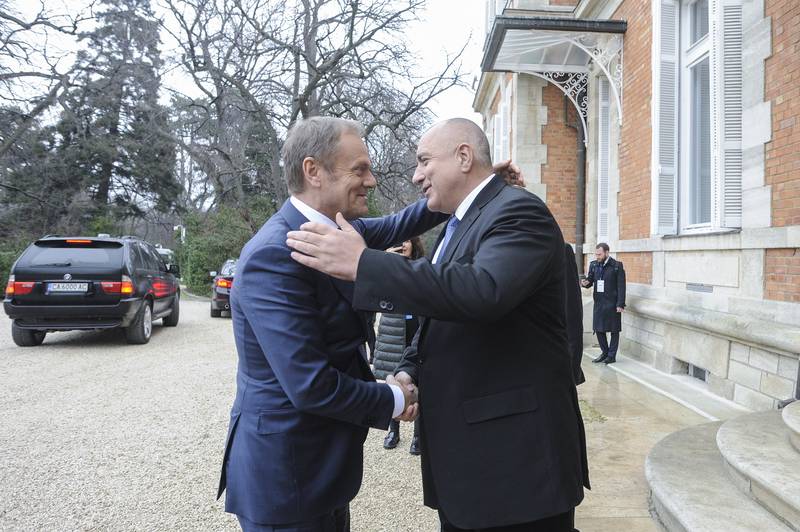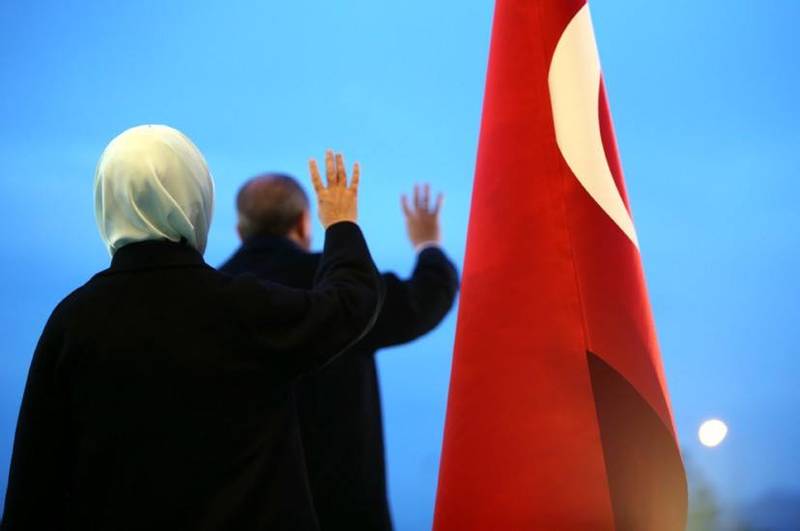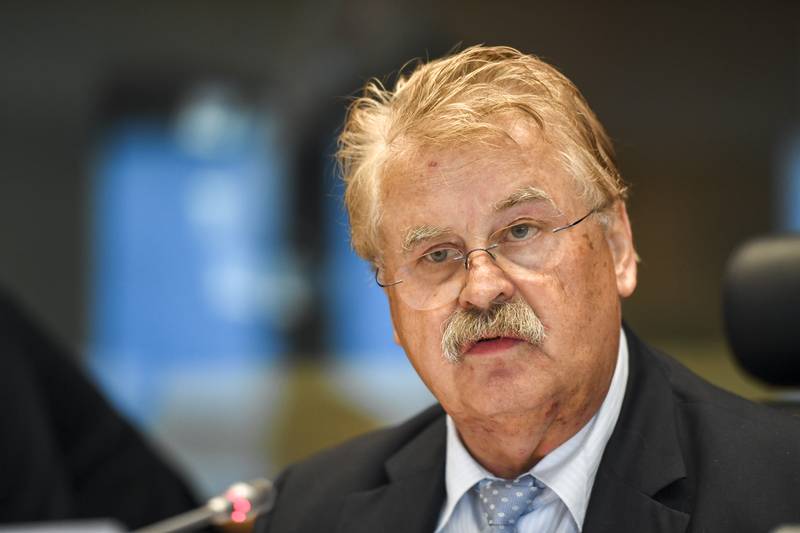The Road to Visa Free Regime with Turkey Is not an Open-Ended Process
Adelina Marini, June 27, 2012
 For the first time in a while the tone in the exchanges between the European Union and Turkey is different and positive. The usual exchange of accusations for the lack of opened chapters and progress in the negotiations process is not there. But, still, we should not hasten with opening the champagne - the good news from the jubilee Association Council EU-Turkey, 50th, which took place on June 22, will be good ... some time in the future. And the news is that for the first time in the dialogue between Brussels and Ankara visa liberalisation is mentioned as an objective which the two sides will work for. Turkey is the only EU candidate country for which visa free regime does not apply, valid for all the others. This is a problem, which the Turkish side emphasises every time during the meetings with EU leaders and which until recently seemed totally unsolvable.
For the first time in a while the tone in the exchanges between the European Union and Turkey is different and positive. The usual exchange of accusations for the lack of opened chapters and progress in the negotiations process is not there. But, still, we should not hasten with opening the champagne - the good news from the jubilee Association Council EU-Turkey, 50th, which took place on June 22, will be good ... some time in the future. And the news is that for the first time in the dialogue between Brussels and Ankara visa liberalisation is mentioned as an objective which the two sides will work for. Turkey is the only EU candidate country for which visa free regime does not apply, valid for all the others. This is a problem, which the Turkish side emphasises every time during the meetings with EU leaders and which until recently seemed totally unsolvable.
What has changed?
A day before the Association Council there was a regular Council of the ministers of social policy and employment, who adopted conclusions for starting a visa liberalisation dialogue but only under strict conditionality. First of all, Ankara has to increase its efforts in effectively preventing and fighting illegal immigration toward the EU's external borders, in compliance with international law. Turkey is also expected to deal decisively with the organised crime groups, who do business with trafficking illegal immigrants. Besides, a full implementation of the existing bilateral readmission agreements is also expected with certain member states of the EU, while the general readmission agreement, which was Turkey's exchange coin against visa liberalisation, is already initialled and remains to be signed and ratified by all member states. When will this happen depends on Turkey, explained Nicolai Wammen, Danish foreign minister, and Stefan Fule, the EU enlargement commissioner.
dialogue but only under strict conditionality. First of all, Ankara has to increase its efforts in effectively preventing and fighting illegal immigration toward the EU's external borders, in compliance with international law. Turkey is also expected to deal decisively with the organised crime groups, who do business with trafficking illegal immigrants. Besides, a full implementation of the existing bilateral readmission agreements is also expected with certain member states of the EU, while the general readmission agreement, which was Turkey's exchange coin against visa liberalisation, is already initialled and remains to be signed and ratified by all member states. When will this happen depends on Turkey, explained Nicolai Wammen, Danish foreign minister, and Stefan Fule, the EU enlargement commissioner.
The Turkish authorities have to conclude and start applying effectively an agreement with the European border agency Frontex, to agree on a cooperation with Europol and to increase the dialogue with the EU on full application of the policy of justice and home affairs. Turkey also has to participate on a partnership basis in improving border management, specifically with Bulgaria and Greece. The Turkish-Greek border is a source of tensions in the EU because Greece does not manage to handle the huge migrant flows from Turkey, which was why the country asked for assistance from Frontex. Moreover, Greece is not only an external border of the EU but also an external border for Schengen. Bulgaria is not a member of Schengen but will be,  after clearing up some domestic issues. But when that happens, it will face the same challenges as Greece, unless the readmission agreement is signed and ratified by then, and if Schengen survives by then.
after clearing up some domestic issues. But when that happens, it will face the same challenges as Greece, unless the readmission agreement is signed and ratified by then, and if Schengen survives by then.
The EU commits to Turkey on a common level and individually. At common level the Commission is tasked by the Council to work in parallel with signing the readmission agreement for the establishment of an action plan for visa liberalisation. Member states, for their part, commit, in close cooperation with the Commission, to continue to "continue making coherent and coordinated efforts to increasingly exploit all possibilities provided by the existing EU Visa Code". Under these words hides a call to those member states, who are against a visa free regime with Turkey, to reconsider their positions or better articulate them in compliance with the visa code.
The reason for the achieved "progress" lies in Turkey's growing significance in regional and global economic and foreign policy aspect. A fact which the Danish foreign minister, Nicolai Wammen, started his statement with on behalf of the EU Presidency: "Today Turkey is to Europe more than a candidate country". This sentence contains the finally realised significance of Turkey as a powerful EU neighbour in a moment when the Union has significantly weakened economic and foreign policy positions because of the eurozone crisis and the austerity policy. The EU was on its way to sleep away a golden opportunity for a change in its relations with Turkey, which should no longer be treated as a poorly developed source of illegal migrants, professing a different and not that tolerated religion anymore in Europe.
The beginning of this process of realisation was in the end of last year when EU Enlargement Commissioner Stefan Fule, with several purely linguistic and diplomatic moves, managed to inject new momentum not only into EU-Turkish relations but also into several "frozen" integration processes in the Balkans (Macedonia, Montenegro, Serbia). He proposed, specifically for Turkey, the "positive agenda", which initially had no concrete forms and objectives, aside from keeping the fibre of dialogue with Ankara, no matter how thin it is. The positive agenda is already bearing fruit, reported Minister Wammen but also Commissioner Fule and Turkey's chief negotiator Egemen Bagis, who for the first time looked really happy and without his usual peevish language.
Moreover, the positive agenda already has some concrete dimensions. On June 14 in Stuttgart, there was a meeting between Egemen Bagis and commissioners Oettinger and Fule (of energy and enlargement). At this meeting, a special cooperation was agreed in the framework of the positive agenda in the area of energy. The reason is that energy is of key interest as for the EU so for Turkey and in fact was often used as a leverage by Turkey in its accession talks with the EU. The agreement consists of five points: Long-term perspectives on energy scenarios and energy mix; Market integration and development of infrastructures of common interest; Global and regional energy cooperation; Promotion of renewable energy, energy efficiency and clean energy technologies; Nuclear safety and radiation protection.
Although there are still no concrete projects in the "Enhanced EU-Turkey Energy  Cooperation" from Stuttgart, it is a big breakthrough because it seems to be the common denominator in the relations between the two sides. Positive cooperation in the area of building gas pipelines of mutual interest, connecting the electric and gas infrastructure, cooperation in the area of nuclear energy and pursuing common goals globally, could prove beneficial in purely economic terms over the EU, which suffers from serious economic troubles to a large extent as a result of the lack of an integrated energy market, because of the not sufficient energy supply diversification, the tough relations with Russia and the common abroad (the Eastern Partnership countries), as well as the excessive dependence of some member states on only one energy supplier. An important element of the energy agreement is that it foresees Turkey to become a regional natural gas hub.
Cooperation" from Stuttgart, it is a big breakthrough because it seems to be the common denominator in the relations between the two sides. Positive cooperation in the area of building gas pipelines of mutual interest, connecting the electric and gas infrastructure, cooperation in the area of nuclear energy and pursuing common goals globally, could prove beneficial in purely economic terms over the EU, which suffers from serious economic troubles to a large extent as a result of the lack of an integrated energy market, because of the not sufficient energy supply diversification, the tough relations with Russia and the common abroad (the Eastern Partnership countries), as well as the excessive dependence of some member states on only one energy supplier. An important element of the energy agreement is that it foresees Turkey to become a regional natural gas hub.
An additional economic boost for the two sides would come from the idea construction of infrastructure of "common interest" to be financed by market-oriented mechanisms, such as the recently presented by the Commission instrument 'project bonds', by public private partnerships or by other European funding tools, including the pre-accession funds IPA.
From the statements of Nicolai Wammen, Stefan Fule and Egemen Bagis on Friday, it becomes clear that everyone got something, which was the reason for the good mood after the meeting. But this did not prevent some other issues which Turkey has on its path toward achieving European standards to be recalled. The first Danish diplomat reminded that the positive agenda was not something to replace the accession negotiations but just to give them a new momentum. Turkey still has to align its legislation to the European, especially in the area of freedom of speech and human rights. Nicolai Wammen expressed special concern with imprisoned journalists and the document published after the Association Council points out that the pace of accession talks would depend on progress in solving the outstanding issues.
Such a problem, which is very likely to aggravate significantly, is the Cyprus issue. In their conclusions the Council and the Commission point out that Turkey has to start applying the Additional Protocol from Ankara, which concerns the enlargement of the customs union to include the new EU member states after 2004, among which the divided into a Greek and Turkish part island of Cyprus. In the declaration from Friday it is said that the EU regrets the statements of Turkey about freezing relations with the EU Presidency in the second half of 2012, which will be taken over by Cyprus. It is again called the entire role of the presidency to be respected as "a fundamental institutional feature of the EU which is provided for in the Treaty on the European Union".
 Cyprus had found a place in the questions of the Turkish journalists during the news conference but in an economic perspective. Recently, it became clear that Cyprus would be another domino tile of failing eurozone countries, which literally hours after Spain announced that it would request assistance from the rescue funds. A Turkish journalist quoted unofficial information to ask whether Cyprus would be capable of implementing its functions of a presidency, given its difficult financial situation. Nicolai Wammen firmly said that the Cypriot Presidency would be like any other and that it was not alone in implementing its tasks - it is part of the presidency trio, introduced with the Lisbon Treaty to ensure full continuity of priorities and to avoid every country to work on an agenda of its own.
Cyprus had found a place in the questions of the Turkish journalists during the news conference but in an economic perspective. Recently, it became clear that Cyprus would be another domino tile of failing eurozone countries, which literally hours after Spain announced that it would request assistance from the rescue funds. A Turkish journalist quoted unofficial information to ask whether Cyprus would be capable of implementing its functions of a presidency, given its difficult financial situation. Nicolai Wammen firmly said that the Cypriot Presidency would be like any other and that it was not alone in implementing its tasks - it is part of the presidency trio, introduced with the Lisbon Treaty to ensure full continuity of priorities and to avoid every country to work on an agenda of its own.
The jubilee Association Council EU-Turkey ended successfully and positively. The question, however, is whether this success would not prove short-term, given that still there are no expectations to achieve progress in the negotiations process - a chapter was opened for the last time two years ago during the Spanish Presidency. Out of 35 chapters, 13 are opened and only one is provisionally closed; 8 are frozen for opening until Turkey applies the Ankara protocol for Cyprus, and other chapters are being blocked by France.
An answer to the question 'when' can be given by Turkey and the EU. If the positive agenda continues to deliver, if Turkey fulfils the conditions for visa liberalisation and if it aligns its legislation with that of the EU in the area of justice, human rights and freedom of speech, there will be chances the accession process to start unfreezing. Given the time for realisation of all this, the question 'when' seems irrelevant at this stage. And as the confidence between the EU and Turkey is not at the desired level to disperse any doubts that the process toward visa liberalisation would be prolonged as much as possible, Commissioner Fule said that this process was not open-ended.
 Donald Tusk, Boyko Borissov | © Council of the EU
Donald Tusk, Boyko Borissov | © Council of the EU | © Turkey Presidency
| © Turkey Presidency Elmar Brok | © European Parliament
Elmar Brok | © European Parliament